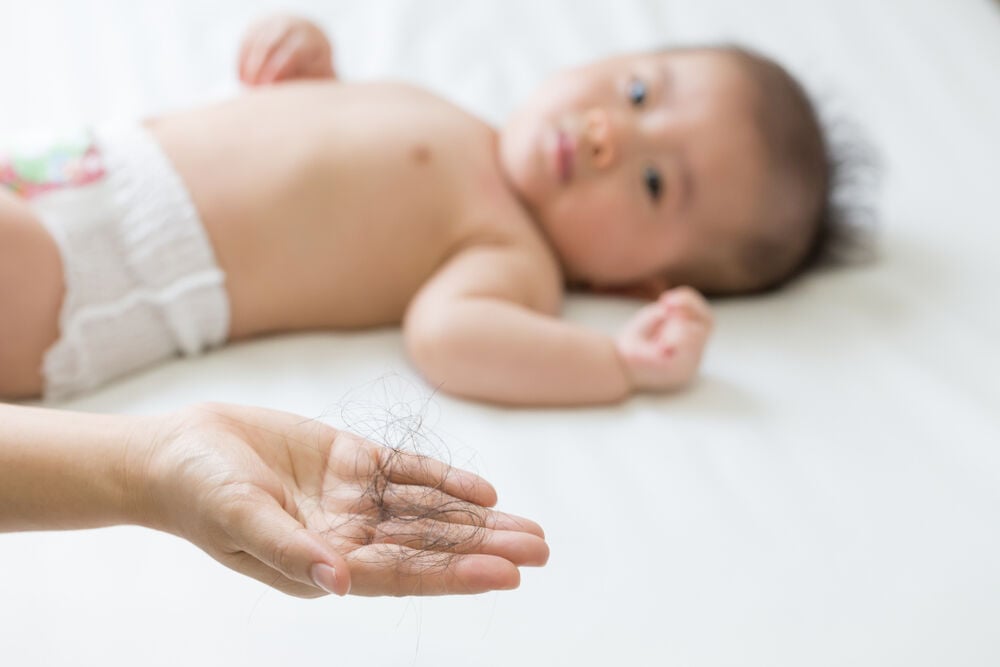Fast-growing and thick hair is a pregnancy symptom that many women love to have. So enjoy your luscious locks while you still can because in the months following delivery, you may experience postpartum hair loss. Read more about the postpartum condition and how to deal with it.
-
Tracking cycle
-
Getting pregnant
-
Pregnancy
-
Help Center
-
Flo for Partners
-
Anonymous Mode
-
Flo app reviews
-
Flo Premium New
-
Secret Chats New
-
Symptom Checker New
-
Your cycle
-
Health 360°
-
Getting pregnant
-
Pregnancy
-
Being a mom
-
LGBTQ+
-
Quizzes
-
Ovulation calculator
-
hCG calculator
-
Pregnancy test calculator
-
Menstrual cycle calculator
-
Period calculator
-
Implantation calculator
-
Pregnancy weeks to months calculator
-
Pregnancy due date calculator
-
IVF and FET due date calculator
-
Due date calculator by ultrasound
-
Medical Affairs
-
Science & Research
-
Pass It On Project New
-
Privacy Portal
-
Press Center
-
Flo Accuracy
-
Careers
-
Contact Us
6 Helpful Tips to Tackle Postpartum Hair Loss


Every piece of content at Flo Health adheres to the highest editorial standards for language, style, and medical accuracy. To learn what we do to deliver the best health and lifestyle insights to you, check out our content review principles.
Don’t panic! Postpartum hair loss is normal.
It can be an alarming discovery. You’re going about your regular hair-care routine; savoring those moments alone where you can tend to your own self-care. When all of a sudden you look down at your brush and find large clumps of your hair tangled in the bristles!
Don’t panic—postpartum hair loss is normal. Learn more about what causes postpartum hair loss, how long it lasts, and some postpartum hair loss remedies to help treat it.
What causes hair loss after giving birth?
All hair on our bodies grows in a cycle that can last anywhere from two to seven years. The active or growing phase of a strand of hair is called anagen and determines the length of our hair. After a period of time, the hair follicle enters a transition phase (called catagen) before entering its resting phase (telogen). Shedding occurs (exogen) and the process starts all over again.
Changes related to your hormone levels before, during and after pregnancy can affect hair growth. It’s completely normal to experience hormonal imbalance after giving birth, and one of the symptoms of hormonal imbalance is postpartum hair loss.
The medical term for postpartum hair loss is telogen effluvium. The condition, which is also referred to as postpartum alopecia, is relatively common, affecting between 40-50% of women in the months following childbirth.
Postpartum hair loss occurs after childbirth because of the sudden change of hormones in your body, particularly the change between progesterone and estrogen.
How hormones affect your hair growth?
In pregnant, postpartum and menopausal women, estrogen is the leading hormone that affects your hair growth.
During pregnancy, your body increases the amount of estrogen it produces which signals more follicles to enter the growing phase than the resting phase of the hair growth cycle. During this time, you may experience fuller, thicker hair. You may also notice that your hair grows significantly faster during pregnancy than it did before you were carrying your little one.
Following childbirth, estrogen levels drop (returning to their pre-pregnancy levels), prompting the hair follicles to enter the resting phase and fewer hairs to grow. After about 100 days in the resting phase, the hair begins to shed.
In addition to the estrogen and progesterone changes in the postpartum period, stress and nutrition impact hormone levels, which and can also influence hair growth.
Thyroiditis, caused by inflammation of the thyroid gland, results in an imbalance of thyroid hormones which can also affect your hair growth.

When does postpartum hair loss start?
Women may begin to experience postpartum hair loss two to four months after childbirth. The amount of hair loss you experience will be different for every woman and is not always relative to your hair quality or quantity during pregnancy. However, your hair loss may seem more extreme if you have longer hair, or experienced a lot of hair growth during pregnancy.
How long does postpartum hair loss last?
Now that you know when and why it starts, you may be asking yourself “when does postpartum hair loss stop”?
It’s important to remember that postpartum hair loss is only temporary. For many women, 4 months’ postpartum hair loss is quite common and postpartum hair loss may continue for several months. Normal hair growth patterns typically return after 6 months postpartum, but some women may experience postpartum hair loss up to a year after childbirth.
Speak with your doctor if you believe you are experiencing severe postpartum hair loss or the symptoms persist for more than a year.
How to prevent postpartum hair loss?
If “how to boost fertility?” is one of the most commonly asked questions about fertility, then “how to prevent postpartum hair loss?” is one of the most common questions women ask in the months after childbirth. Fortunately, some of the answers are similar!
You can prevent postpartum hair loss by maintaining a healthy body and lifestyle in the weeks and months following delivery:
- Ensure that you are getting regular, gentle-to-moderate exercise.
- Consume a healthy diet rich in nutrients to support your changing body and help its postpartum recovery.
- Take postpartum vitamin and mineral supplements if recommended by your doctor.
How to stop postpartum hair loss?
Because postpartum hair loss is a normal result of your changing hormones, it is not something that you can immediately stop. However, there are steps you can take to minimize the effects of postpartum hair loss and help promote healthy hair growth.
Here are six things you can try for postpartum hair loss treatment:
Maintain a healthy diet
We all know that maintaining a healthy diet is an important factor for optimal health and wellbeing. For postpartum women in particular, a healthy diet can help your overall recovery and stop postpartum hair loss from progressing.
Make sure your diet includes the necessary balance of vitamins and nutrients found primarily in vegetables, whole grains and fresh fruit. Remember to drink plenty of water throughout the day in order to stay hydrated.
Take nutritional supplements
If you are concerned with postpartum hair loss, speak with your doctor about taking vitamin or mineral supplements to help stop hair loss and promote hair regrowth.
The American Pregnancy Association recommends the following:
- Vitamin B complex and/or biotin (B7)
- Iron
- Vitamin C
- Vitamin E
- Zinc
These nutrients may already be present in your postpartum recovery plan, so be sure to talk to your doctor before taking any supplements.
Reduce stress
Taking steps to reduce your stress levels has the added benefit of helping to regulate hormone imbalances.
Practice different relaxation techniques like mindfulness, meditation or breathing exercises. Make time for regular gentle or moderate exercise, which can also help reduce stress. Ask for friends and loved ones for help taking care of the baby or even household chores if you’re feeling overwhelmed.
Take a quiz
Find out what you can do with our Health Assistant
Hair loss postpartum, though stressful, is a completely normal symptom of your changing hormones after birth. One of the postpartum symptoms you shouldn’t neglect, however, is depression. Be sure to speak to your loved ones or doctor if you are feeling highly anxious, angry, or overwhelmed in the weeks and months following delivery.
Change your hairstyle
You may have heard of the cliché “mom haircut”—a shorter hairstyle that many new moms go for after their baby is born. While many women turn to the mom ‘do for practical reasons, the shorter style may also help reduce the appearance of postpartum hair loss.
Regardless of the length of your hair, adjust your styling to reduce the amount of “stress” you put on the hair. Limit vigorous brushing to avoid tearing or splitting the hair and try not to pull the hair forcefully into styles like ponytails, cornrow braids or weaves.
Modify your hair care routine
You may find that modifying your hair care routine can help stop further hair loss. Try using a postpartum hair loss shampoo that is fortified with biotin and silica and a deep-moisture conditioner.
Hair is more fragile when wet so brush gently after you wash your hair or wait for it to dry. Set your hairdryer to a cool setting and avoid using hot rollers or straightening irons to prevent further damage that can be caused by excessive heat.
Your hair may also benefit from other specialty products that a dermatologist can recommend, like scalp sprays and hair masks.
Go natural
During postpartum hair loss, try letting your tresses simply be instead of coloring your hair or using harsh gels and sprays for styling.
You may want to opt for natural oils, which are said to help strengthen hair growth and reduce or stop hair loss:
- You can try to add a few drops of peppermint oil to your shampoo it can help moisturize the hair and improve its shine.
- Consume fish or flaxseed oils. This may help restore optimal levels of essential fatty acids like omega-3, omega-6 and omega-9, which promote healthy hair.
- You can try to gently massage almond oil or castor oil into the scalp as this can stimulate hair growth.
Be patient
Hair loss can be a startling and distressing postpartum symptom for many women but as the old adage goes: this too shall pass!
Summing up
Typically, postpartum hair loss will correct itself as hormone levels return to normal. Try not to stress about temporary hair loss and accept that it is simply a normal part of recovering from childbirth.


Hey, I'm Anique
I started using Flo app to track my period and ovulation because we wanted to have a baby.


The Flo app helped me learn about my body and spot ovulation signs during our conception journey.


I vividly
remember the day
that we switched
Flo into
Pregnancy Mode — it was
such a special
moment.
Real stories, real results
Learn how the Flo app became an amazing cheerleader for us on our conception journey.
References
https://www.viviscal.ca/hair-growth-cycle
http://jcs.biologists.org/content/119/3/391
https://www.livestrong.com/article/150138-hormones-that-affect-hair-growth/
https://www.thyroid.org/thyroiditis/
http://www.dydermatology.com/blog/every-woman-know-postpartum-hair-loss/
https://www.livestrong.com/article/497896-can-i-take-prenatal-vitamins-biotin/?ajax=1&is=1
https://harvokseclinic.com/how-to-overcome-severe-postpartum-hair-loss-problem/
https://harvokseclinic.com/how-to-overcome-severe-postpartum-hair-loss-problem/




